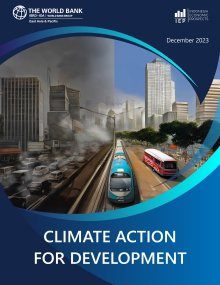Indonesia can tackle climate challenges while achieving strong long-term growth
Private consumption is anticipated to be the primary driver of growth in 2024. Business investment and public spending are also expected to pick up as a result of reforms and new government projects.
Inflation is expected to ease to 3.2% in 2024 from an average of 3.7% this year, within the target band of Bank Indonesia. Falling inflation reflects the softening in commodity prices and a return to normal rates of growth in domestic demand after the post-pandemic bounce-back. At the same time, there is some upward pressure on food prices due to the effects of the El-Niňo weather pattern, which could disrupt food production in some places.
Services exports are expected to benefit from a continued recovery in tourism, while lower commodity prices and weaker global growth will hamper exports of goods. Government revenues as a share of GDP are expected to rise as the effects of tax reforms materialize, while government spending is expected to gradually return to pre-pandemic levels.
Although Indonesia’s economy is larger today than at any time before, like many other countries it has yet to fully recover to its pre-pandemic trajectory. This reflects scarring effects from the pandemic, including in labor markets and productivity growth.
The overall economic outlook is subject to downside risks, primarily ones that could emanate from outside Indonesia: higher-for-longer interest rates in major economies could weigh on global demand, raise borrowing costs, and make it harder to borrow on world markets. Global geopolitical uncertainty could disrupt value chains.
“Indonesia has a track record of navigating shocks and maintaining economic stability,” said World Bank Country Director for Indonesia and Timor-Leste Satu Kahkonen. “The challenge for the country is to build on strong economic fundamentals to deliver faster, greener, and more inclusive economic growth. To achieve such growth, it is important to continue implementing reforms that remove bottlenecks that limit efficiency, competitiveness, and productivity growth. Doing so will enable Indonesia to accelerate growth, create more and better jobs, and achieve its vision of becoming a high-income country by 2045.”
A special section of the report offers suggestions for how Indonesia can speed economic growth and strengthen resilience while slowing greenhouse gas emissions. Indonesia’s transition to a low-carbon and climate-resilient economy could, in fact, generate a new phase of economic growth and poverty reduction.
Indonesia can build on progress it has made in addressing the challenges associated with climate changes with fiscal, financial and trade policies. Fiscal policies can help raise revenues and disincentivize fossil fuel use. Financial instruments like green bonds can mobilize finance for climate mitigation and adaptation. Trade policy reforms could make it easier to import products needed for climate change adaptation and mitigation.
Indonesia can advance its green transition by developing plans to complete fuel subsidy reforms and expand carbon pricing. It could simplify or phase out non-tariff trade measures applicable to green goods.
“Through a series of targeted actions, Indonesia can boost underlying drivers of productivity and efficiency, helping to reduce the short-term costs of emissions cuts and adaptation, while strengthening long-run growth prospects,” said World Bank Lead Economist for Indonesia and Timor-Leste Habib Rab.
The Indonesia Economic Prospects is supported by funding from the Australian Department of Foreign Affairs and Trade.

